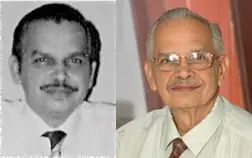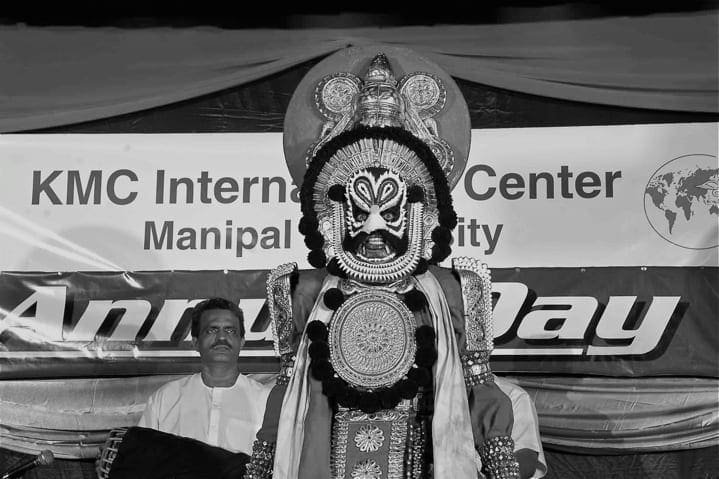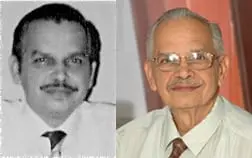
According to Dr. Rao, “Physiology is the basis of medicine. For instance, without physiology, there is no pathology. And without pathology, there is no medicine.” Dr. Rao could have told me, “Physiology is important because it sounds cool,” and I still would have believed him. The reason is simple: he is the best at what he does. His respect and love for education and knowledge is why he answered my first question with such simplicity and logic.
Dr. Rao’s hard working ethics stemmed from his simple upbringing. Born and raised just outside of Manipal with six siblings, his parents taught him the importance of education and discipline. This fueled his drive to succeed in all aspects of life. Being the first student to successfully finish a post-?graduate degree during his time was only the first of his many accomplishments. With 45 years of teaching experience under his belt, very few people can contest Dr. Rao’s achievements.
From his seventeen memorable years as Dean of KMC to his multiple “Teacher of the Year” awards, Dr. Rao has all the reason to boast his success. However, he does the exact opposite. I experienced the full extent of his humility and grounded demeanor during our interview.
Ashok Natarajan: Can you tell me a bit about your upbringing?
Dr. P.L.N. Rao: I was born and raised in a village nearly ten kilometers from Manipal. I was one of seven children; five boys and two girls. No one really knew about contraception in those days (laughing). My parents raised us under a very disciplined household. Every morning we would wake up at 4:30am to study and wash our clothes, and be in bed by 7:30pm after our supper and studies. I always appreciated the discipline my father taught me. So much so, I wanted to join the army. Back then, many people associated joining the army with a quick death. So needless to say, my parents said, “No way!”
Ashok Natarajan: What was your favorite subject in school as a child?
Dr. P.L.N. Rao: I enjoyed all the subjects. If I had to choose though, I would have to say science was my favorite and strongest. I knew I needed a strong basis in science if I wanted to become a good physician.
Ashok Natarajan: When did you know you wanted to become a doctor?
Dr. P.L.N. Rao: I was very young. I believe I was in the fourth standard when a local disaster occurred. My village was very close to the Arabian Sea and the local Swarna River. It was raining very heavily that day and a small boat capsized. Unfortunately there were six or seven children on board, and two of them drowned and died. If there was a doctor in our village, those children might have had a chance to live. That’s when I thought to myself, “I should become a doctor.”
Ashok Natarajan: How did you perform academically in college?
Dr. P.L.N. Rao: In Mysore, I majored in Chemistry, Botany, and Zoology. After Mysore, I did my MBBS at KMC in 1966. In my last year of my MBBS, I had excellent scores in surgery. That was my main focus at the time. I was always very studious though, even in my earlier years. Sometimes, I would study anywhere between eight to ten hours a day.
Ashok Natarajan: How were your pre-?clinical professors back then?
Dr. P.L.N. Rao: They would only teach us the bare minimum in their lectures, leaving us to study on our own. If you can believe it, they taught us the Central Nervous System in nine days. They would suggest textbooks at the very most. A group of friends and myself would allot each other different sections to study. One person would find out the normal cardiac output, while another, the normal blood pressure, and so on. Then we would all prepare our notes and teach each other. That’s how we survived medical school.
Ashok Natarajan: How about your professors on the clinical side?

Dr. P.L.N. Rao: They were absolutely amazing. Those professors were all trained abroad, mostly from London. There was one that stood out among the rest: Dr. K.G. Das. He was the best clinician I’ve ever seen and a master of all subjects. He was a methodical examiner, and patients held him in such high regard. The way he examined female patients with such respect was unlike any other doctor I had seen. With a single touch, he could make 40% of his patients’ symptoms disappear (laughing). Those professors were the best, and they expected the best from their students. Whenever we’d make mistakes they’d say to us, “Why are you here? You’re ruining the reputation of this college!” They would say these things only to make us better students so we wouldn’t repeat our mistakes.
Ashok Natarajan: What can you tell me about the years between 1985 and 2002?
Dr. P.L.N. Rao: That was the time I was Dean of KMC. In fact, at one time I was the sole Dean of KMC, Dental, Nursing, and Pharmacy, and I was teaching five classes a week. I had a very good teaching and non-?teaching staff to make my life easier. My task was simplified though, with the help of the Pai family. Managing a campus of 5000-?6000 students by myself was a great challenge, but not impossible. This is thanks to the Pai family’s guidance in my early years as Dean.
Ashok Natarajan: How was KMC run under your supervision as Dean?
Dr. P.L.N. Rao: The students and professors liked me as Dean. I think more than anything they appreciated the fact that I dealt in absolutes. It was always either “Yes” or “No”, never “maybe”—black or white, never gray. There was never any confusion in what I said or meant. I may have been strict, but I was always fair. We always gave students warnings and second chances. If an issue ever escalated to suspension of a student, it never lasted more than one or two days.

Ashok Natarajan: Being responsible for so much, you must have been near impossible to meet. Was this the case?
Dr. P.L.N. Rao: No, not at all. No matter who it was—non-?teaching staff, clerks, professors, students—I always made myself available. No one would have to make an appointment with a secretary to meet with me. I would answer my phone calls and make my own appointments. When people did come and see me, I would give them an answer right then and there. Policies change with different Deans and this was just the way I wanted to work.
Ashok Natarajan: How were disobedient or disruptive students dealt with?
Dr. P.L.N. Rao: Like I said, they were given warnings and small threats of blemishes on their permanent records if they did not change their behavior. One very isolated incident happened between two students who will remain unnamed. I was leaving for the day and walking to my car when I saw a struggle in the distance. I approached them, and saw a young male student choking another female student with one hand and slapping her with the other. I immediately yelled, “Stop!” and he turned and saw it was the Dean. He took his hands off of her and stood there helpless. After making sure the female student was okay, I told the young man to report to the Dean’s office first thing the next morning. When he came to my office, I told him I put his act of violence on the notice board, with his name and the extent of his punishment. After that, I’m sure you know what happened. This was a very extreme and rare case of disciplinary action that I had to take.
Ashok Natarajan: How did KMCIC approach you for the teaching position?
Dr. P.L.N. Rao: The Dean of KMCIC at that time, Lt. Colonel Gokhale, had offered me the position as Physiology HOD just as I was about to retire. I liked the program and how he ran the school. I was only 65, still very young and energetic (laughs).
Ashok Natarajan: I think it’s fair to say that students believe you to be the scariest Viva Proctor. What’s your opinion on this?
Dr. P.L.N. Rao: It’s true, I am strict and I expect the best out of my students. So I can see why some of the students may be nervous or scared during exam week. Many of my students have said otherwise though. They will be cursing the fact that they have me for viva, but when they leave the exam they’re very glad I was the proctor. I think this because I never start with difficult questions. I’ll always start with a simple concept or question and then slowly increase the difficulty as the exam progresses. If a student is able to answer a difficult question but misses the other ones, he will get 100%. The students must be rewarded for their hard work.
Ashok Natarajan: You have won the “Teacher of the Year” award four years in a row. What must a teacher do to attain such an honor?
Dr. P.L.N. Rao: The only reason I won those awards was because of my students. They vote and decide who wins. That is when a teacher knows they’re doing their job well. The best way for a teacher to gauge his or her merit is whether or not a student enjoys their teaching. Besides this though, a good professor must always prepare well and be up to date with all the latest information about the subject. Our students are overwhelmed everyday with the curriculum and their extracurricular activities. A good professor can help them by taking such complicated subjects and simplifying them for the students.
Ashok Natarajan: Any advice for the student body?
Dr. P.L.N. Rao: Work hard. Work hard in everything you do, no matter the task. Please never aim for 70% or pass. Always set your sights on 90% or above. Above all, do not be embarrassed if you need help. The material is very complicated. I was a student once and I know how difficult medicine can be. There is no shame in asking your teaching staff for help after school or on the weekends. I am always here to help. I will never deny a student help if they ask, none of us will. I clean my own clothes, make my food, and occasionally garden. I don’t trouble my wife with such concerns. I’m a trustee on eight or nine different committees, an avid student of Yakshagana, and am still very socially active.
This interview was first published in the Second issue of the IC Gazette, December 2010. The interview was conducted by Ashok Natarajan.


I had Dr. PLN Rao as my physiology Professor during my 1st year in MBBS. One of the best teachers I’ve ever had. I even had him for my viva in the University Exam and he was an excellent examiner. He’d call you out on your mistakes but he also gave everyone a second chance to correct themselves. He was also quite the comedian, regaling us with stories from his days as a medical student and when he first became a professor at KMC.